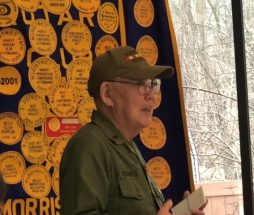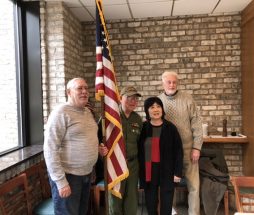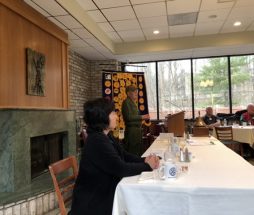3月13日、古本会長がニュージャージ州Morris Plains市のロータリークラブ朝食会に招待され公演を行ないました。
 |
 |
 |
ロータリークラブの会誌より:
Last week’s speaker was Tak Furumoto on being Japanese in USA and Japan during WWII.Tak’s family had emigrated to the USA with his grandfather in 1911. His grandparents returned to Japan before the war had started but Tak’s father stayed. Tak’s father had started out as a migrant farm worker who began a business wholesaling produce and was successful until he was forced to give it up to go to a Japanese-American intern-ment camp in Tule Lake, CA. The families were given 10 days notice and only allowed 1 suitcase. Tak was born in the internment camp in 1944 and the family, his parents and 3 sisters, were incarcer-ated there for 4 years. The camp had aprox. 18,000 people in it and everyone was in barracks that slept 8. Tak commented that other Axis power nationalities were not put into internment camps like the Japanese. He believes it was because of the shock of the Pearl Harbor attack that the USA reacted so drastically and uncharacteristically.Tak’s family moved from the internment camp back to his father’s native Hiroshima, where his grand-parents were, following the bombing and his par-ents were told they could not emigrate again to the USA.In Hiroshima Tak and his sisters found it hard to make friends because they were, in the eyes of many Japanese, Americans and caused the suffer-ing in the area. Tak recalls care packages that arrived and his sisters would take all the candy but he got to keep the marbles. Tak enjoyed this be-cause the other kids would play with him when he had marbles but not otherwise. Tak also recalled a cowboy outfit that he received and he wore around the neighborhood and told everyone he would wear it all the time but his mother had to sell it to help pay for food for the family. This made Tak sad and he cried all day but he understood eventually why his Mother had done it.One thing his parents always impressed on his sisters and hm was to study and do well in school so they could do better than his parents had. So both he and his sisters studied very hard.In 1952 one of his sisters emigrated back to the USA. In 1956 the rest of the family relocated back to the USA in Los Angeles. There was a loophole in the immigration law that allowed children to bring siblings and parents to the USA and that is how his parents were allowed back. There was still a stig-ma being Japanese in the L.A. area but the family felt it was better than being back in Japan.Tak graduated from UCLA and then volunteered for Vietnam. He went to OCS in 1968, he met his future wife Carolyn at this time, and was assigned as an intelligence unit. He was stationed in Vi-etnam from 1970-71 and received a Bronze Star during his service. When he returned from Vi-etnam in 1971 he moved to Fort Lee, NJ. He did not find a lot of opportunity for work so he opened the first Japanese American real estate firm in Ber-gen County. The business was rough at first as Tak was dealing with both PTSD and agent orange exposure. He said that his wife Carolyn was his rock and without her he would not had been able to be where he is today. Tak became a success and found a niche helping Japa-nese compa-nies and fami-lies with reloca-tion services in the NY/NJ area. He now is in his 46th year and has offices in White Plains, Manhattan, and Fort Lee and 50 licensed staff.Tak had more stories but we ran out of time. An interesting talk. Thank you to the Furumoto family for sharing it with us.


